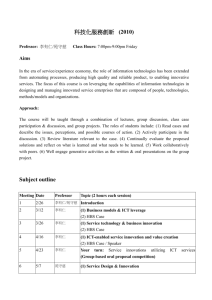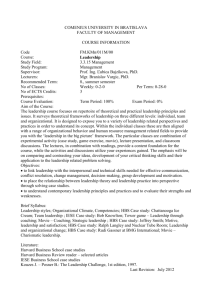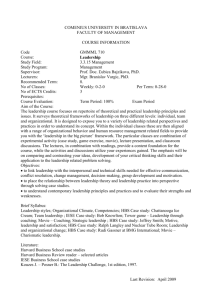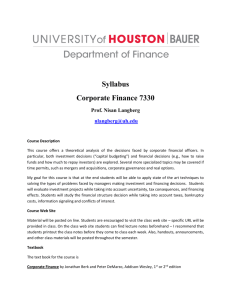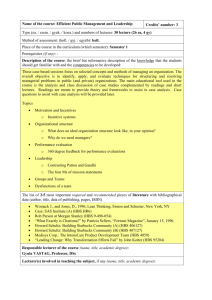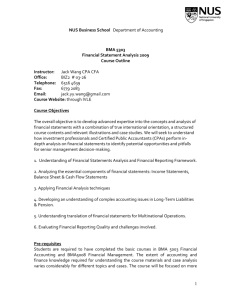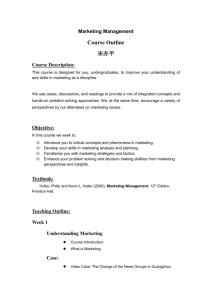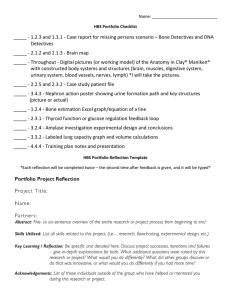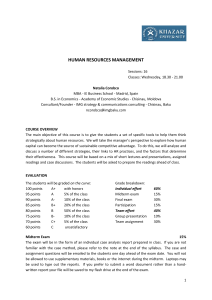Economic Analysis Techniques (Weeknight MBA 701) Dr. Frank Raymond
advertisement
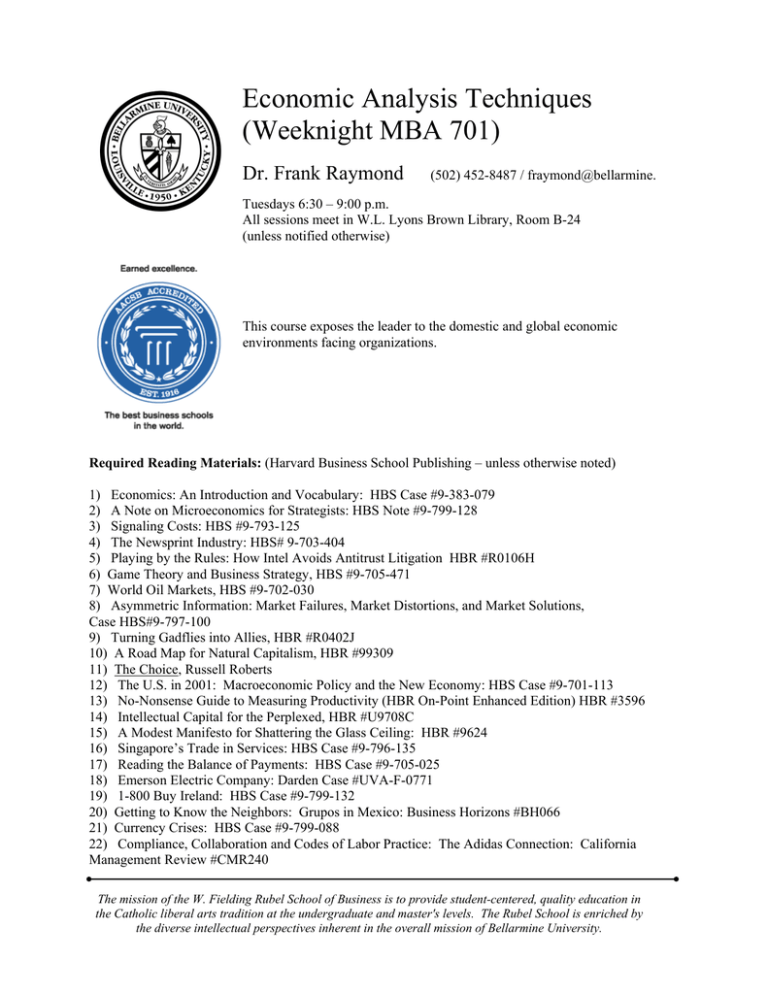
Economic Analysis Techniques (Weeknight MBA 701) Dr. Frank Raymond (502) 452-8487 / fraymond@bellarmine. Tuesdays 6:30 – 9:00 p.m. All sessions meet in W.L. Lyons Brown Library, Room B-24 (unless notified otherwise) This course exposes the leader to the domestic and global economic environments facing organizations. Required Reading Materials: (Harvard Business School Publishing – unless otherwise noted) 1) Economics: An Introduction and Vocabulary: HBS Case #9-383-079 2) A Note on Microeconomics for Strategists: HBS Note #9-799-128 3) Signaling Costs: HBS #9-793-125 4) The Newsprint Industry: HBS# 9-703-404 5) Playing by the Rules: How Intel Avoids Antitrust Litigation HBR #R0106H 6) Game Theory and Business Strategy, HBS #9-705-471 7) World Oil Markets, HBS #9-702-030 8) Asymmetric Information: Market Failures, Market Distortions, and Market Solutions, Case HBS#9-797-100 9) Turning Gadflies into Allies, HBR #R0402J 10) A Road Map for Natural Capitalism, HBR #99309 11) The Choice, Russell Roberts 12) The U.S. in 2001: Macroeconomic Policy and the New Economy: HBS Case #9-701-113 13) No-Nonsense Guide to Measuring Productivity (HBR On-Point Enhanced Edition) HBR #3596 14) Intellectual Capital for the Perplexed, HBR #U9708C 15) A Modest Manifesto for Shattering the Glass Ceiling: HBR #9624 16) Singapore’s Trade in Services: HBS Case #9-796-135 17) Reading the Balance of Payments: HBS Case #9-705-025 18) Emerson Electric Company: Darden Case #UVA-F-0771 19) 1-800 Buy Ireland: HBS Case #9-799-132 20) Getting to Know the Neighbors: Grupos in Mexico: Business Horizons #BH066 21) Currency Crises: HBS Case #9-799-088 22) Compliance, Collaboration and Codes of Labor Practice: The Adidas Connection: California Management Review #CMR240 The mission of the W. Fielding Rubel School of Business is to provide student-centered, quality education in the Catholic liberal arts tradition at the undergraduate and master's levels. The Rubel School is enriched by the diverse intellectual perspectives inherent in the overall mission of Bellarmine University. Required Reading Materials - Handouts: (the following materials will be distributed in class). • • Labor markets and human capital by Frank Slesnick, Ph.D. Selected brief articles, primarily from the Wall Street Journal and Economist. Grading Elements / Assessment: (Percentages) Letter Grade A AB+ B BC F Verbal Descriptor G.P.A Equivalent Lower Limit 4.00 3.67 3.33 3.00 2.67 2.00 0.00 93.0% 90.0% 87.0% 83.0% 80.0% 73.0% 00.0% Excellent Average Below Average Failing to to to to to to to (Points) Upper Limit Lower Limit 100.0% 92.9% 89.9% 86.9% 82.9% 79.9% 72.9% 930 900 870 830 800 730 0 Upper Limit to to to to to to to 1,000 929 899 869 829 799 729 There are 1,000 points possible in this course. To receive a grade of “A” a student will need to earn at least 930 points, a “B” will require at least 830 points, and a “C” will require 730 points. In the MBA program grades of “D” are not given. A student who earns fewer than 730 points will not pass the course. Points are assigned as follows: Graded Component • • • • • • Professionalism (each student will receive a “current status grade” and feedback near the midpoint of the term sent to their Bellarmine e-mail account). Predicting Market Fluctuations Macro-Finance Competitive Strategies International Finance FDI Type Due Date Points Possible Individual Ongoing 250 Individual Individual Team Pairs Group September 6th October 4th October 18th November 8th November 29th 125 125 150 100 250 Page 2 Tentative Schedule of Activities and Assignments: Competitive Markets (Session #1 of 14) Day / Date Pre-Class Readings Tuesday August 23rd 1) Economics: An Introduction and Vocabulary: HBS Case #9-383-079, pp. 1-11. (This case serves as a guide throughout the course.) 2) A Note on Microeconomics for Strategists: HBS Note #9-799-128, pp. 1-6, 9-14, 7-8, 14-19. Deadlines/ Assignments Due None Session Learning Objectives and Outcomes: By the end of the session, students should be able to: • Describe the way command and market systems allocate scarce resources. • Understand the basic market-equilibrium supply and demand model. • Describe the basic characteristics of a competitive market and the effects of changes in demand and supply on market adjustments. Market Share, Monopoly Power and Antitrust (session #2 of 14) Day / Date Pre-Class Readings Tuesday August 30th 3) Signaling Costs: HBS #9-793-125 4) The Newsprint Industry: HBS# 9-703-404 5) Playing by the Rules: How Intel Avoids Antitrust Litigation. HBR #R0106H Deadlines/ Assignments Due None Session Learning Objectives and Outcomes: By the end of the session, students should be able: • Analyze Costs using an economic approach. • Understand how signaling costs can affect market share, as in the case of Nutrasweet. • Describe monopolistic markets and compare them to competitive environments. • Understand the means by which monopolies may be controlled while still allowing dynamic change and growth in the market. Page 3 Strategic Business Decisions using Game Theory (Session #3 of 14) Day / Date Pre-Class Readings Tuesday September 6th 6) Game Theory and Business Strategy, HBS #9-705-471 7) World Oil Markets, HBS #9-702-030 Deadlines/ Assignments Due Individual Assignment 1: Predicting Market Fluctuations (These assignments will be brief (2-3 page) analyses of a relevant topic) Session Learning Objectives and Outcomes: By the end of the session, students should be able to: Use game theory to make decisions concerning capital formation. To use game theory to understand the ramifications of coordinated output or pricing behavior by oligopolists such as OPEC. Market Failure & Role of Government (Session #4 of 14) Day / Date Pre-Class Readings Tuesday September 13th 8) Asymmetric Information: Market Failures, Market Distortions, and Market Solutions, Case HBS#9-797-100 9) Turning Gadflies into Allies, HBR #R0402J1 10) A Road Map for Natural Capitalism, HBR #99309 Deadlines/ Assignments Due None Session Learning Objectives and Outcomes: By the end of the session, students should be able to Understand how market failure arises from asymmetric information and prescribe methods to improve efficiency. Understand how the presence of externalities leads to market failure and to describe and recommend pollution policies that will lead to economic efficiency and equity. Understand the “Tragedy of the Commons” dilemma, and its impact on business decisions. 1 Some Cases are listed in multiple sessions because of the integrated nature of the topic. Page 4 Tracking the U.S. Economy (Session #5 of 14) Day / Date Pre-Class Readings Tuesday September 20th 1) Economics: An Introduction and Vocabulary: HBS Case #9-383-079, pp. 11-17. 11) Begin reading The Choice in anticipation of forthcoming international economics material (Session 9). Deadlines/ Assignments Due None Session Learning Objectives and Outcomes: By the end of the session, students should be able to: • • • Understand and measure the business cycle in the economy. Understand and analyze the effectiveness of the tools used to achieve macroeconomic goals of low levels of unemployment and inflation. Discuss the relationship between unemployment and inflation with an assessment of the impact of a positive supply shock on the economy. Macroeconomic Policy (Session #6 of 14) Day / Date Pre-Class Readings Tuesday September 27th 12) The U.S. in 2001: Macroeconomic Policy and the New Economy: HBS Case #9-701-113 Deadlines/ Assignments Due None Session Learning Objectives and Outcomes: By the end of the session, students should be able to: • Analyze the importance of uncertainty in macroeconomic dynamics and the formulation of macroeconomic policy. • Discuss economic and political development in the U.S. during the later 1990s. Page 5 The Basics of Factor Markets (Session #7 of 14) Day / Date Pre-Class Readings Tuesday October 4th Notes to be distributed in class by instructor 13) No-Nonsense Guide to Measuring Productivity (HBR On-Point Enhanced Edition) HBR #3596 10) A Road Map for Natural Capitalism, HBR #99309 Deadlines/ Assignments Due Individual Assignment 2: Macro-Finance and ArbitrageUnderstanding the relationship between stock and bond markets. Session Learning Objectives and Outcomes: By the end of the session, students should be able to: • Describe the relationship between productivity and wage. • Analyze how labor markets may deviate from the standard competitive model. In particular, examine the impact of unions and the existence of labor market discrimination on the relationship between wage and productivity. Human Capital and Discrimination (Session #8 of 14) Day / Date Pre-Class Readings Deadlines/ Assignments Due Tuesday October 18th 14) Intellectual Capital for the Perplexed: HBR #U9708C 15) A Modest Manifesto for Shattering the Glass Ceiling: HBR #9624 In-Class Group Project: Strategies for when competitive markets fail Session Learning Objectives and Outcomes: By the end of the session, students should be able to: • Explain what is meant by the concept of human capital and what factors influence its role in determining earnings of individuals. • Describe the trends that have occurred with regards to market wages, labor force participation rates, unemployment, and total number of years in the labor force. Page 6 Globalization and Trade: Comparative Advantage, Productivity and Wages, Balance of Payments, Current and Capital Accounts (Session #9 of 14) Day / Date Pre-Class Readings Tuesday October 25th 16) Singapore’s Trade in Services: HBS Case #9-796-135 11) The Choice (provides an intuitive foundation for understanding the cases) Deadlines/ Assignments Due None Session Learning Objectives and Outcomes: By the end of the session, students should be able to: • Discuss the benefits and costs associated with comparative advantage, gains from trade, and structural adjustment. • Evaluate the impact of freer trade on world markets and geopolitics. International Finance: Spot and Forward Currency Markets, Hedging, Purchasing Power Parity, and Interest Rate Parity (Session #10 of 14) Day / Date Pre-Class Readings Tuesday November 1st 17) Reading the Balance of Payments: HBS Case #9-705-025 18) Emerson Electric Company: Darden Case #UVA-F-0771 Deadlines/ Assignments Due None Session Learning Objectives and Outcomes: By the end of the session, students should be able to: • Discuss the basic elements of international currency and capital markets. • Describe and predict market outcomes and volatility. Page 7 International Finance: Spot and Forward Currency Markets, Hedging, Purchasing Power Parity, and Interest Rate Parity - continued (Session #11 of 14) Day / Date Pre-Class Readings Deadlines/ Assignments Due Tuesday November 8th 18) Emerson Electric Company: Darden Case #UVA-F- 0771 (continued) Pair Assignment: International Finance Session Learning Objectives and Outcomes: By the end of the session, students should be able to: • Describe the impact of currency fluctuations on the value of foreign assets over time. Markets, Regional Trade Pacts and Monetary Union (Session #12 of 14) Day / Date Pre-Class Readings Deadlines/ Assignments Due Tuesday November 15th 19) 1-800 Buy Ireland: HBS Case #9-799-132 None Session Learning Objectives and Outcomes: By the end of the session, students should be able to: • Analyze the benefits of foreign direct investment derived by both foreign firms and their host country. • Understand how domestic macroeconomic policy impacts FDI. Page 8 Issues Affecting Foreign Direct Investment: Cultural Constraints, Currency Crises, the IMF and the World Bank (Session #13 of 14) Day / Date Pre-Class Readings Tuesday November 22nd 20) Getting to Know the Neighbors: Grupos in Mexico: Business Horizons #BH066 21) Currency Crises: HBS Case #9-799-088 Deadlines/ Assignments Due None Session Learning Objectives and Outcomes: By the end of the session, students should be able to: • Appreciate that the success or failure of business practices and economic policy often depends on the degree to which entrepreneurs and policy makers understand cultural norms, local politics and business practices. • Formulate strategies to help predict situations in which FDI would be mutually beneficial, and determine appropriate reactions during periods of increasing economic risk. Ethical Issues in International Business: Labor Issues and the Environment (Session #14 of 14) Day / Date Pre-Class Readings Tuesday November 29th 22) Compliance, Collaboration and Codes of Labor Practice: The Adidas Connection: California Management Review #CMR240 9) Turning Gadflies into Allies, HBR #R0402J Deadlines/ Assignments Due Class Group Project and Presentation; FDI Session Learning Objectives and Outcomes: By the end of the session, students should be able to: • Discuss the relationship between foreign direct investment, labor practices and environmental degradation. • Assess the degree to which industrialized countries and world organizations can influence changes within autonomous governments. • Judge the effectiveness of international policy concerning just business practice. • Understand the importance and complexities of foreign direct investment (FDI) in a variety of situations. Page 9 Professionalism: Student Professional Behavior and Etiquette in the MBA Program Due Date: Ongoing Possible Points: 250 Project Type: Individual A positive and participative learning environment is crucial to your educational experience. The goals of our MBA program include developing your willingness and ability to contribute to discussions by expressing and defending your position on a variety of topics. For some, this may involve overcoming a sense of shyness. For others, it will involve the willingness to take risks and leave your “comfort zone”. While there are many informal situations in which people have neither the desire nor the right to prescribe how others ought to behave, the classroom is unique, and requires the establishment of a culture that respects the learning process and every individual in it. Professionalism is a significant factor in determining your overall grade in this course. The evaluation of professionalism starts with the proposition that if a student attends scheduled sessions, comes to class prepared, participates actively and frequently, makes meaningful comments that contributes to their classmates’ education, interacts professionally with faculty and classmates, hands in all required work on time, participates in the teaching evaluation process, and observes class guidelines, their score will be assessed as “average” or at a numerical level of roughly 85%. Adjustments either up or down from this starting point are at the discretion of the professor – to recognize superior effort and performance or acknowledge deficiencies in the student’s approach to their responsibilities. Given the many hours you spend preparing for class discussions, reading articles and textual material, analyzing case studies, and working on individual and group projects, as well as the significant financial commitment you (and/or your organization) are making to undertake graduate study, each individual is responsible for creating and maintaining this professional environment. For these reasons, the following guidelines/expectations are provided. Your physical presence in the classroom is a prerequisite for active participation. Students that come late or are not prepared to begin when class starts disrupt the class. Please make every effort to arrange your schedule so that you arrive early enough to take care of any personal or non-class related activities and are ready when class begins. Breaks are worked into class sessions at reasonable intervals. Please wait until a break is called before leaving the classroom (emergencies or special needs notwithstanding). For breaks and other breakout activities, return at the time specified by the instructor. Your mental presence as well as physical presence is necessary for everyone to get the most out of the classroom experience. Our MBA classes are interactive forums. Your activities, both positive and negative, have an effect on the class. Please focus your attention and energies on our class exclusively when the class is in session. Discourteous and unprofessional activities that interfere with your mental presence include: • • • • • • Beginning to pack up your materials before the class is dismissed Checking or receiving e-mail during class Engaging in side discussions with other students or on the phone Internet surfing Text messaging others Listening to headphones Page 10 • • • • Playing games Reading the newspaper Sleeping Working on other classes or projects Technology has provided us with many conveniences; however, there is a time and a place for them. If you bring a cell phone, beeper, laptop, PDA, or other electronic device to class that can make a noise, please switch it to vibrate or silent mode when you come into the room. If this becomes a problem, I will resort to Dr. Luthy’s methods (ref. MBA. 702 syllabus)! Unprofessional behaviors that will lower your course grade include (but are not limited to): • • • • • • • • • Attempting to exclude others, Being unprepared for class, Coming late to class or leaving early (including breaks), Distractive grunts when others are speaking, Dominating the classroom discussion, Inappropriate language, Off-the-cuff remarks, Personal attacks on others (including written comments on evaluations and e-mail), and Unfounded criticism. Professional behaviors include (but are not limited to): • • • • • • • • Answering questions posed by others, Asking perceptive questions related to topics under discussion, Being conversant with assigned materials, Linking current topics and ideas to previously covered material Making comments that build upon what others have contributed Making distinctions between facts and opinions, Opening new, relevant areas for discussion, and Volunteering relevant practical experiences. Given the numerous and varied experiences you will have during your program of study, both in and out of the classroom, as well as practice and growing familiarity with various teaching formats, the faculty’s expectation regarding the depth and sophistication of your contributions will rise as you progress through the program. Group project behavior, because of its significance in the program, carries with it its own set of faculty expectations: • • • • • • Adequate time and effort put into group activities Dependability of individuals to meet with their group and meet work deadlines High quality of work and ideas submitted to the group Preparedness of individuals when attending group meetings Respectful attitude toward the project and other members of the group Sharing of responsibilities in achieving the goals of each project Page 11 Professionalism in the MBA program extends beyond the classroom. It encompasses the faceto-face as well as electronic interactions you have with students in your class and cohort, with faculty, and with administrators and staff. Observing these guidelines is the minimum expectation of the faculty. While the specific audience for this message constitutes a small percentage of all students, everyone benefits from a clear statement of expectations. If you have an issue or question not particularly related to the content of the course, but rather the administration of the MBA program please contact Dr. Julie Toner, Director of Graduate Studies at 502-452-8494 or Ms. Laura Richardson, MBA Director at 502-452-8258. Her assistant, Ms. Loretta Jerdan can also answer many questions (502-452-8245). Practicing professionalism will make you more productive and will lead to the achievement of your individual and group goals. You will also find that the attitude of professionalism you develop here will benefit your larger life at work and your personal life. Individual Assignments: 1. Predicting Market Fluctuations 2. Macro-Finance and Arbitrage- understanding the relationship between stock and bond markets. Due Dates: September 6 and October 4 Possible Points: 125 each Project Type: Individual A week prior to each due date, you will be given a brief article or economic problem to analyze. Each of the two analyses is to be no more than 3 pages in length (double spaced-minimum 12 point font), including diagrams: • Contain an explanation of the economic problem you are investigating, • Contain a well constructed argument applying some of the relevant analytic • • • techniques learned in Class; Contain positive and normative conclusions; Be very clear and concise, yet comprehensive; and Be word-processed and include reference, footnotes, and relevant diagrams and/or tables. Page 12 Team Presentation: Competitive Strategies Due Date: October 18 Presentation Attire: Business Casual: Possible Points: Project Type: 150 Men Dress or golf/polo shirt, slacks. Team Women Blouse, slacks or skirt. Your team will provide an assessment of incidences of market failure in the industries in which you work. In particular, address the nature of the failure, the skewed costs and benefits as a result of this failure, the nature and extent to which these failures have been addressed by your companies, and suggestions to improve market efficiency. Grading Rubric: Needs Work Fair Good Very Good Excellent 60-69 70-74 75-79 80-84 85-89 90-94 Poor Needs Work Fair Good Very Good Excellent 60-69 70-74 75-79 80-84 85-89 90-94 95-100 Poor 0 Truly Outstanding None Content Criteria (100%) Opening and introduction Organization of information Quality of recommendation(s) Closing / finish Question and answer session Truly Outstanding Stylistic Criteria (0% - advisory only) 95-100 Body Language (posture, movement, gestures) Eye Contact (varied, all areas of room) Vocal Qualities (projection, pace, non-monotone) Smooth Delivery (Confidence, rhythmic flow, no “ahs” or ums”) Style (excitement, professional appearance) Page 13 Pair Assignment: International Finance Due Date: November 8 Presentation Attire: Business Casual: Possible Points: Project Type: 100 Men Dress or golf/polo shirt, slacks. Pairs Women Blouse, slacks or skirt. Each pair will analyze, develop and deliver a 10 -15 minute presentation concerning what they believe is the optimal investment choice for Emerson Electric. Grading Rubric: Needs Work Fair Good Very Good Excellent 60-69 70-74 75-79 80-84 85-89 90-94 Poor Needs Work Fair Good Very Good Excellent 60-69 70-74 75-79 80-84 85-89 90-94 95-100 Poor 0 Truly Outstanding None Content Criteria (100%) Opening and introduction Organization of information Quality of recommendation(s) Closing / finish Question and answer session Truly Outstanding Stylistic Criteria (0% - advisory only) 95-100 Body Language (posture, movement, gestures) Eye Contact (varied, all areas of room) Vocal Qualities (projection, pace, non-monotone) Smooth Delivery (Confidence, rhythmic flow, no “ahs” or ums”) Style (excitement, professional appearance) Page 14 Group Project and Presentation: FDI Due Date: November 29 Presentation Attire: Business Casual: Possible Points: Project Type: 250 Men Dress or golf/polo shirt, slacks. Team Women Blouse, slacks or skirt. Each Team will research, develop, and deliver a 15-20+ page paper and 15-20 minute presentation on a country they believe could be a good location for a business of your choice (countries will be assigned on a first come, first serve basis). Your analysis must include research you do concerning the benefits and likely problems involved with foreign direct investment in the country you choose. Be sure to use the economics you have been exposed to! Grading Rubric: Needs Work Fair Good Very Good Excellent 60-69 70-74 75-79 80-84 85-89 90-94 Poor Needs Work Fair Good Very Good Excellent 60-69 70-74 75-79 80-84 85-89 90-94 95-100 Poor 0 Truly Outstanding None Content Criteria (100%) Opening and introduction Organization of information Quality of recommendation(s) Closing / finish Question and answer session Truly Outstanding Stylistic Criteria (0% - advisory only) 95-100 Body Language (posture, movement, gestures) Eye Contact (varied, all areas of room) Vocal Qualities (projection, pace, non-monotone) Smooth Delivery (Confidence, rhythmic flow, no “ahs” or ums”) Style (excitement, professional appearance) Page 15 About the Instructor: Dr. Frank Raymond is Associate Professor and Chair of the Department of Economics at Bellarmine University. He earned his undergraduate degree in mathematics from the College of the Holy Cross in Worcester, Massachusetts and a master’s degree in mathematics from The University of North Carolina, Chapel Hill. He earned a Ph.D. in Economics from Indiana University with fields in international economics, mathematical economics and public finance. His primary field of expertise involves mathematical modelling of issues in international development. He also has on-going research projects in forensic economics and economic pedagogy. Dr. Raymond began his teaching career at an international high school in Austria where he also consulted for Schwingenschlügel Fabrik in Salzburg, developing the prototype software for cutting and welding liquid containment vessels. Since beginning his Ph.D. work he has taught at Rose-Hulman Institute for Technology and Northeastern University, as well as at each of his alma-maters. While at Northeastern University he began a continuing relationship as an economic consultant to a multidisciplinary group investigating policy reform of rural credit markets in South Asia for the Asian Development Bank in Manila. He has published in the Review of Development Economics, the Pennsylvania Economic Review and Contemporary Education. He has also written several reviews and opinion pieces. Page 16
